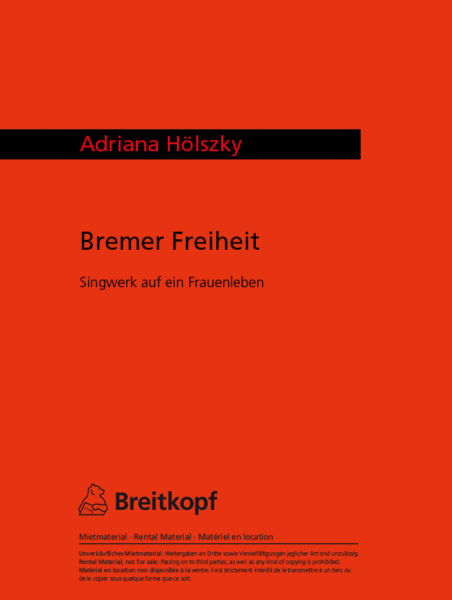Adriana Hölszky (*1953) Bremer Freiheit
Singwerk auf ein Frauenleben [Soli,Orch,Zuspielung] 1987 Dauer: 65'
Soli: SMezAATTTTBBBar – Orchester: Fl(Picc.A-Fl.B-Fl).Ob(Eh).Klar(Es-Klar.B-Klar.Kb-Klar).Fg(Kfg) – Trp(Picc-Trp.Flhn) – 2Pos Schl.Zymbal(Hackbrett.Flhn) – Akk – 2Vl.2Vc.Kb – Zuspielung
Uraufführung: München (Münchener Biennale für neues Musiktheater), 4. Juni 1988
Libretto: Thomas Körner nach dem gleichnamigen Schauspiel von Rainer Werner Fassbinder
Ort und Zeit: Bremen, 1831
Personen: GEESCHE GOTTFRIED (Mezzosopran) MILTENBERGER, IHR ERSTER MANN (Bariton) TIMM, IHR VATER (Bass) MUTTER (Alt) GOTTFRIED, IHR ZWEITER MANN (Heldentenor) ZIMMERMANN, EIN FREUND (Charaktertenor) RUMPF, EIN FREUND (Lyrischer Tenor) JOHANN, IHR BRUDER / BOHM, EIN VETTER (Heldenbariton) LUISE MAUER, EIN FREUNDIN (Hoher Sopran) PATER MARKUS (Tiefer Bass) EINE ALTSTIMME
Jeder Sänger und jeder Instrumentalist wird mit verschiedenen zus. Instrumenten ausgestattet.
Die Lebendigkeit und die Frische der Personen, das Grausame, was darin steckt, das Ironische, das Lächerliche und das wirklich Groteske – das bietet so eine breite Palette an Möglichkeiten, die selten zu finden ist. Und ich hatte Glück mit dem Librettisten Thomas Körner aus Hamburg. Er hat den Text von Fassbinder hervorragend intensiviert. Er schneidet wie ein Messer. In diesem Text steckt so eine Urkraft, etwas Wildes, Ungebärdiges. Und mich hat diese Gestalt der Giftmischerin gereizt – dieses Schema: ich morde jeden, der mich stört, und dadurch gelange ich zur Befreiung. Diese Befreiung ist eigentlich eine Illusion. Sie kommt aus der Unfreiheit und führt zur Unfreiheit. Sie befreit sich nicht, sondern verwickelt sich in ihrem eigenen Netz. Ihr Freiheitskampf gibt unheimliche Möglichkeiten, mit dem Klang zu arbeiten. Der Klang versucht, sich wirklich zu befreien. Der ganze Klangapparat, die fünfzehn Instrumente werden in Blöcke zersplittert, und nach jedem Lichtwechsel gibt es einen Tausch von Instrumenten, so daß sich der Klang wirklich bewegt und frei im Raum wandert. Die Instrumentalisten sind nicht an einem Ort fixiert. Sie können frei im Raum disponiert werden. Sie bilden einen Bestandteil des Bühnenbildes. Ein Klarinettist kann wie ein Stuhl sein oder ein Posaunist wie ein Tisch. Sie haben die Funktion von Bühnenbildelementen und nicht von klanglicher Begleitung. Sie sind wie Personen. Und hier gibt es viele Möglichkeiten für die Bühne, ein Musiktheater zu machen, wo nicht zwischen Klang, zwischen Handlung, Aktion, theatralischen Elementen, Farbe getrennt wird.“
(Adriana Hölszky)
CD:
Produktion der Staatsoper Stuttgart, Ensemble avance, Ltg. András Hamary
Wergo WER 5411 2
Bibliografie:
Feuchtner, Bernd: 1988. Bremer Freiheit, in: ders., Die Oper des 20. Jahrhunderts in 100 Meisterwerken, Hofheim: Wolke 2020, S. 601-607
Hiekel, Jörn Peter: Chaotische Zustände auskomponieren. Adriana Hölszkys Musiktheaterstück Bremer Freiheit als Werk des Durchbruchs, in: Adriana Hölszky, hrsg. von Ulrich Tadday (Musik-Konzepte, Neue Folge Heft 160/161), München: edition text+kritik 2013, S. 43-56.
Kostakeva, Maria: Metamorphose und Eruption. Annäherung an die Klangwelten Adriana Hölszkys, Hofheim: wolke 2013 (S. 29-35).
Spassov, Bojidar: Der Tod als Wiederholungsspiel im Bremer Freiheit von Adriana Hölszky, in: Katastrophe, Sühne Erlösung: Der Tod im (Musik-)Theater, hrsg. von Jürgen Kühnel, Ulrich Müller und Oswald Panagl (= Wort und Musik. Salzburger akademische Beiträge 72), Anif/Salzburg: Mueller-Speiser 2010, S. 492-497.









